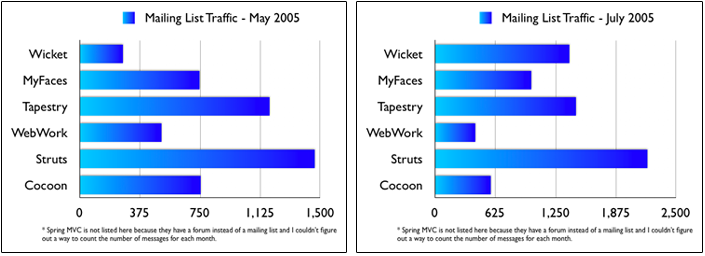Wicket is the most widely used Java Web Framework
According to this post, Wicket is the most widely used Java web framework. While I believe his statements are true, IMO it's only true in the context of this guy's post. My guess is that most of the folks that read his post were Wicket users, or somehow the Wicket Team got wind of this and told users to e-mail this guy. The main reason I don't believe that Wicket is the most popular is because it's so new. I do think it's an up and coming framework that may become the most popular, but I don't think it's there yet.
So, to answer this question, I believe that claiming Wicket to be the most widely is Just Good Guerilla PR. To put some numbers behind that, here's some graphs showing mailing list traffic for the various Java web frameworks.

Granted, these are just indicators of the number of users - but I believe they are a good indicator. One interesting note about these stats is that Wicket's mailing list traffic has increased significantly in the past few months. Ironically, here's what one of the Wicket developers had to say about this statistic about a month ago:
... who says having a lists that has a lot of traffic is a good thing? It might just as well be an indication of a too-hard-to-understand framework having insufficient documention.
In the past couple of months, I've spoke in front of 25+ Java developers on 4 different occasions to talk about web frameworks. I've asked those developers which frameworks they've used, or plan on using. Struts is still the most widely used, with WebWork and Tapestry the least used. Surprisingly, JSF seemed to be getting no traction among the the audiences I spoke to. Even more surprising (to me at least) was that the most popular web framework continues to be the in-house framework. The overwhelming majority of the developers I've talked to aren't even using open-source web frameworks.


Posted by Rich Livingstone on June 29, 2006 at 10:09 PM MDT #
It's not that wicket is not a good concept, its just that nobody is writing enough good tutorials. Or nobody is writing good books. I read the Pro Wicket book, and its really outdated.
Like Spring and Hibernate, to become widely used, wicket should invest in creating documentation.
Posted by Ice on November 18, 2007 at 07:32 PM MST #